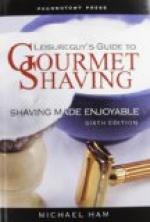“No—no, not if she really cares. But does she care—enough?”
“I hope so. I guess so. But if she doesn’t it’s better for him to know it, and know it now. . . . Dear, dear!” he added, “how I do fire off opinions, don’t I? A body’d think I was loaded up with wisdom same as one of those machine guns is with cartridges. About all I’m loaded with is blanks, I cal’late.”
She was not paying attention to this outburst, but, standing with one hand upon the latch of the kitchen door, she seemed to be thinking deeply.
“I think you are right,” she said slowly. “Yes, I think you are right. It is better to know. . . . Jed, suppose—suppose you cared for some one, would the fact that her brother had been in prison make any difference in—in your feeling?”
Jed actually staggered. She was not looking at him, nor did she look at him now.
“Eh?” he cried. “Why—why, Ruth, what—what—?”
She smiled faintly. “And that was a foolish question, too,” she said. “Foolish to ask you, of all men. . . . Well, I must go on and get Babbie’s breakfast. Poor child, she is going to miss her Uncle Charlie. We shall all miss him. . . . But there, I promised him I would be brave. Good morning, Jed.”
“But—but, Ruth, what-what—?”
She had not heard him. The door closed. Jed stood staring at it for some minutes. Then he crossed the lawn to his own little kitchen. The performances he went through during the next hour would have confirmed the opinion of Mr. Bearse and his coterie that “Shavings” Winslow was “next door to loony.” He cooked a breakfast, but how he cooked it or of what it consisted he could not have told. The next day he found the stove-lid lifter on a plate in the ice chest. Whatever became of the left-over pork chop which should have been there he had no idea.
Babbie came dancing in at noon on her way home from school. She found her Uncle Jed in a curious mood, a mood which seemed to be a compound of absent-mindedness and silence broken by sudden fits of song and hilarity. He was sitting by the bench when she entered and was holding an oily rag in one hand and a piece of emery paper in the other. He was looking neither at paper nor rag, nor at anything else in particular so far as she could see, and he did not notice her presence at all. Suddenly he began to rub the paper and the rag together and to sing at the top of his voice:
“’He’s my
lily of the valley,
My bright and
mornin’ star;
He’s the
fairest of ten thousand to my soul—Hallelujah!
He’s my
di-dum-du-dum-di-dum—
Di—’”
Barbara burst out laughing. Mr. Winslow’s hallelujah chorus stopped in the middle and he turned.
“Eh?” he exclaimed, looking over his spectacles. “Oh, it’s you! Sakes alive, child, how do you get around so quiet? Haven’t borrowed the cat’s feet to walk, on, have you?”




